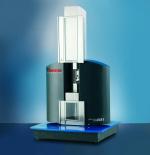The Thermo Scientific HAAKE CaBER is the only commercially available extensional rheometer, that now makes it possible to quantify the extensional properties of fluids using normal force measurement. This option was developed by Prof. Dr. Manfred Wilhelm, Karlsruhe Institute of Technology and Rüdiger Brummer of Beiersdorf in Hamburg, who provided application engineering support to the project.
The measuring principle of the easy-to-use, software-controlled extensional rheometer involves placing a sample between two plates and moving the upper plate upwards at very high speed in order to produce a fluid filament. A laser micrometer is used to determine the decrease in filament diameter as a function of time. Physical effects such as surface tension, elasticity, viscosity and mass transfer determine the extensional flow and can be quantified using model fitting analysis. In this way, important insights can be gained for such processes as fluid filling behaviour, the hardening of adhesives or the spray behaviour and misting of printing inks and wall paints. The measuring principle is ideally suited for viscoelastic samples which form cylindrical filaments on extension, such as cosmetic emulsions, hair colours, printer inks, food products, or certain adhesives.
The expanded measuring concept now also permits the measurement of samples with non-cylindrical filament formation and is based on a highly sensitive, fast, normal force measurement in the sub-milli-Newton range which is integrated in the lower measuring geometry of the instrument and combined with modern data-recording technology. The normal force which acts on the lower plate is determined while the upper plate is already moving upwards. In this way, information regarding filament formation and extensional properties is determined, which is not available from the classic HAAKE CaBER experiment.

